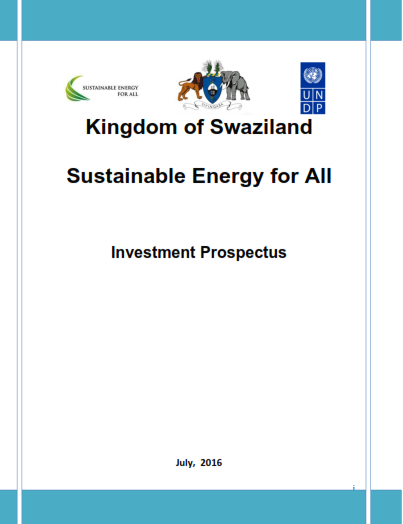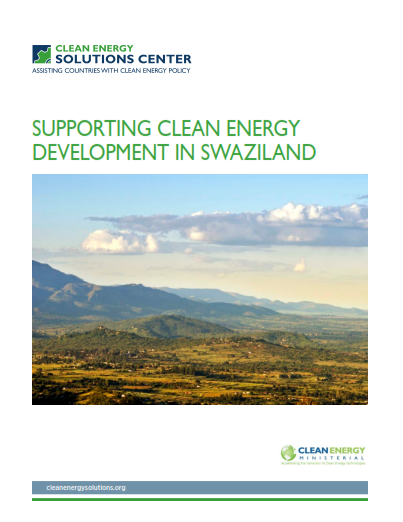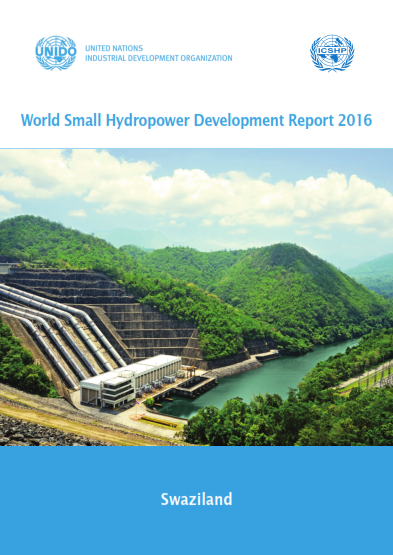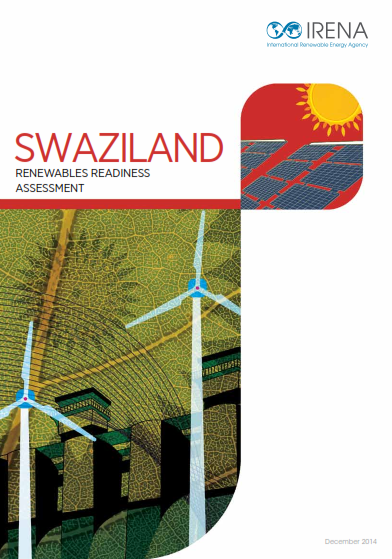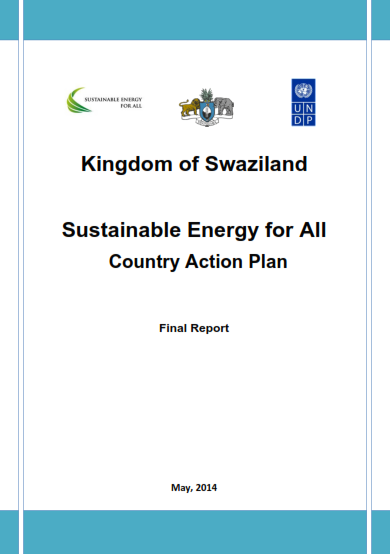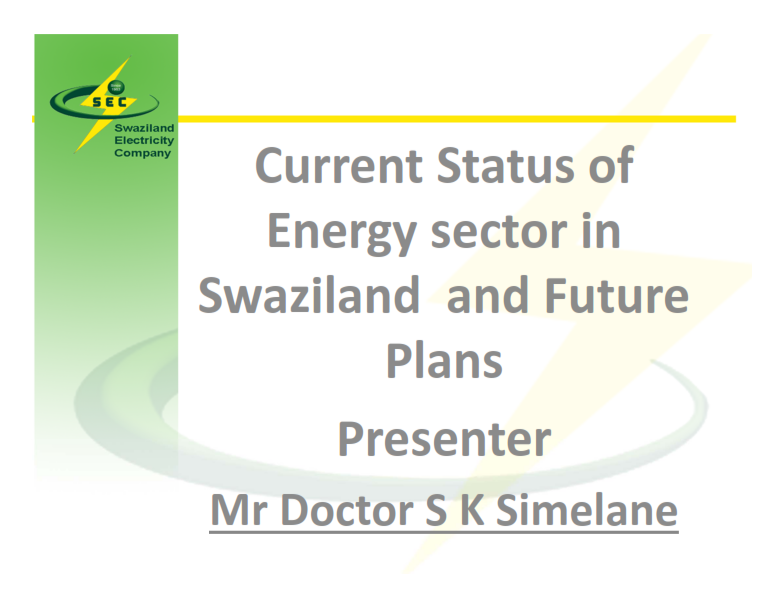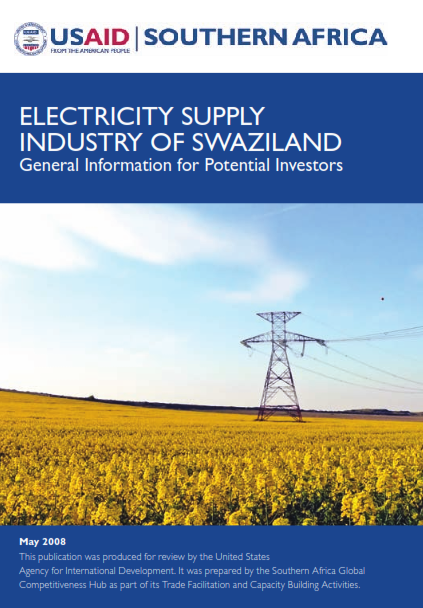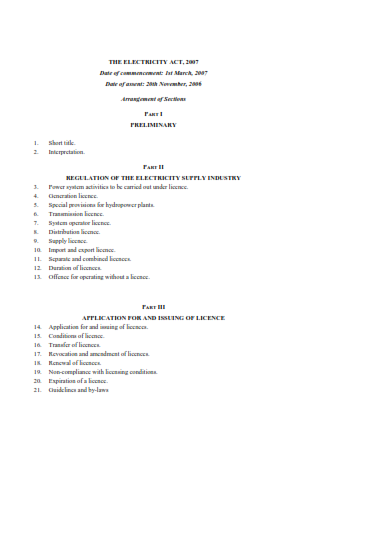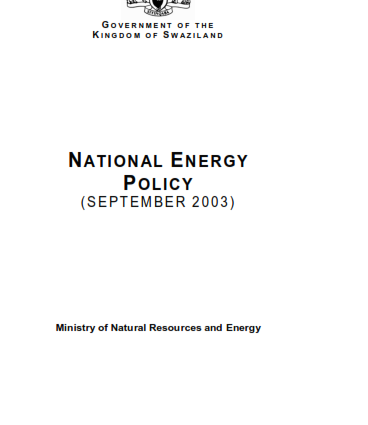We post here the relevant reports for the power sector in Swaziland. Feel free to join our efforts and share us any other you may have found. We'd be glad to add them to the list. Just send an email to This email address is being protected from spambots. You need JavaScript enabled to view it.
Publication date: 2016, July
Author: SE4ALL
Description: Swaziland is participating in the Sustainable Energy for All (SE4ALL) Initiative of the UN General Assembly, as one of the 43 participating African countries out of 83 countries globally. The Initiative aims at mobilizing action from the global community, governments, the private sector, and civil society around three objectives: i) ensuring universal access to modern energy services; ii) doubling the global rate of improvements in energy efficiency; and iii) doubling the share of renewable energy in the global energy mix, all to be reached by 2030. In response to the Initiative, Swaziland has developed its SE4ALL Agenda and Investment Prospectus for Swaziland, with the support of the UNDP. This document is the Investment Prospectus of the Kingdom of Swaziland.
Download Report >>
Publication date: 2016, April
Author: Clean Energy Solutions
Description: Swaziland, a country largely dependent on regional fossil fuel imports to meet power needs, is vulnerable to supply changes and price shocks. To address this challenge, the country’s National Energy Policy and Implementation Strategy prioritizes actions to enhance energy independence through scaling up renewable energy and energy efficiency. With approximately 70% of the country lacking electricity, Swaziland is also strongly committed to expanding energy access to support key economic and social development goals. Within this context, energy security and energy access are two foundational objectives for clean energy development in Swaziland.
Download Report >>
Publication date: 2016
Author: UNIDO
Description: The Kingdom of Swaziland is a landlocked country in Southern Africa bordering South Africa in the north, south and west and Mozambique in the east. Swaziland is no more than 200 km north to south and 130 km east to west. The western half is mountainous at 1,050-1,200 m above sea level, descending to a Lowveld region to the east at 300 m above sea level. The eastern border is characterized by the escarpment of the Lebombo Mountains. The highest point is Emlembe at 1,862 m.
Download Report >>
Publication date: 2014, December
Author: IRENA
Description: Swaziland’s electricity import tariffs have doubled from 2009 to 2012, with the trend set to continue, resulting in rising end-user tariffs. This has made renewable energy, produced from abundant indigenous resources, increasingly competitive. Bagasse co-generation from the sugar industry could meet about half the country’s electricity demand sustainably. Falling technology costs have made solar photovoltaic (PV) power increasingly competitive.
Download Report >>
Visit Website >>
Publication date: 2014, May
Author: SE4ALL
Description: In recognition of the critical need to improve global access to sustainable, affordable and environmentally sound energy services and resources, the United Nations General Assembly declared 2012 the International Year of Sustainable Energy for All and urged Member States and the UN system to increase the awareness of the importance of addressing energy issues and to promote action at the local, national, regional and international levels. In response, the UN Secretary General launched a global Initiative to achieve Sustainable Energy for All by the year 2030.
Download Report >>
Publication date: 2012
Author: SEC
Description: General Information:
- Capital ‐ Mbabane;
- Languages ‐ English language, Swazi language;
- ISO Code ‐ SZ, SWZ;
- Area - 17.364 km²;
- Population - 1.185.000 (2009).
Download Report >>
Publication date: 2008, May
Author: Power Africa
Description: Swaziland is located in the eastern part of southern Africa. It is a landlocked country and shares borders with South Africa and Mozambique. In 2007 Swaziland had an installed capacity of 70MW and a peak demand of 172MW.
Download Report >>
Publication date: 2007, March
Author: Ministry of Natural Resources and Energy
Description: This Act may be cited as the Electricity Act, 2007.
Download Report >>
Publication date: 2003, September
Author: Ministry of Natural Resources and Energy
Description: The energy sector formulated strategies that are in line with the National Development Strategy (NDS), which has set a standard of living target for the country and a place in the world order, intended to be achieved in the year 2022. The strategies in the NDS placed a need for the development of a comprehensive energy policy that would encompass all the various policy initiatives, action plans, studies, research and demonstration projects. The Ministry approved the formulation of an energy policy in order to guide the energy developments of the country.
Download Report >>





